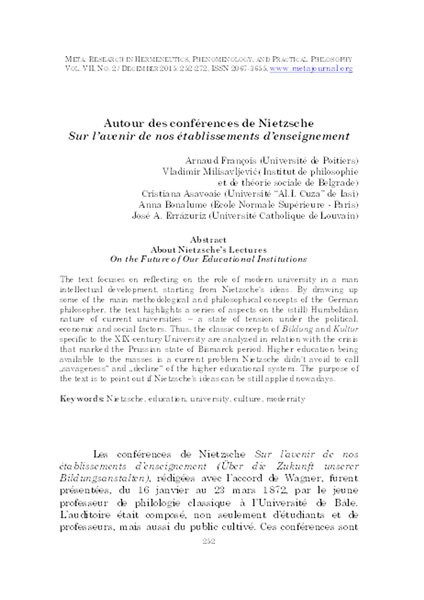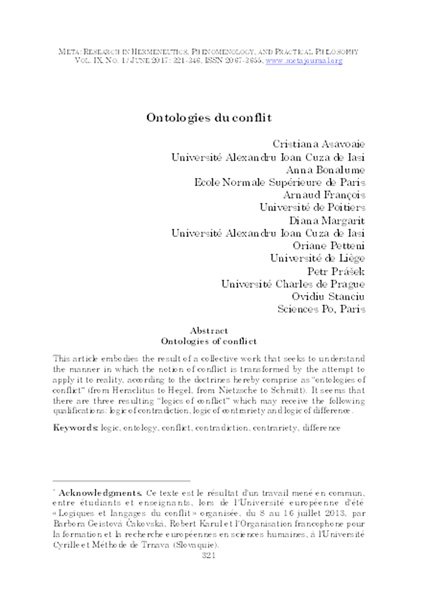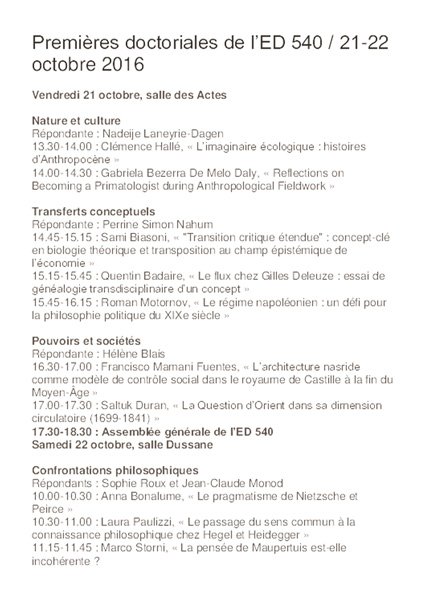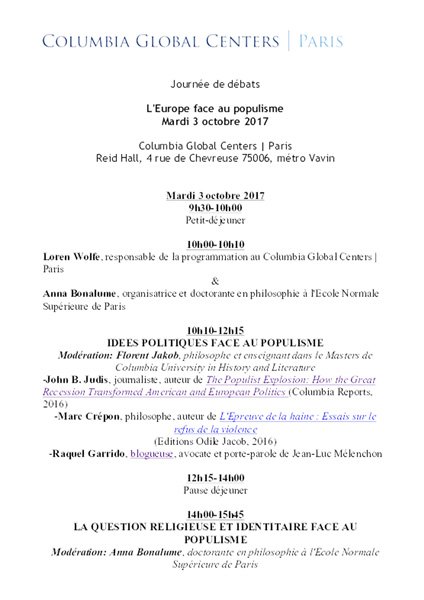Papers

Autour des conférences de Nietzsche Sur l’avenir de nos établissements d’enseignement
by Anna Bonalume e Arnaud François
The text focuses on reflecting on the role of modern university in a man intellectual development, starting from Nietzsche’s ideas. By drawing up some of the main methodological and philosophical concepts of the German philosopher, the text highlights a series of aspects on the (still) Humboldian nature of current universities – a state of tension under the political, economic and social factors. Thus, the classic concepts of Bildung and Kultur specific to the XIX-century University are analyzed in relation with the crisis that marked the Prussian state of Bismarck period. Higher education being available to the masses is a current problem Nietzsche didn’t avoid to call ” savageness ” and ” decline ” of the higher educational system. The purpose of the text is to point out if Nietzsche’s ideas can be still applied nowadays.

Ontologies du conflit
by Anna Bonalume, Diana Margarit e Petr Prášek
This article embodies the result of a collective work that seeks to understand the manner in which the notion of conflict is transformed by the attempt to apply it to reality, according to the doctrines hereby comprise as ” ontologies of conflict ” (from Heraclitus to Hegel, from Nietzsche to Schmitt). It seems that there are three resulting ” logics of conflict ” which may receive the following qualifications: logic of contradiction, logic of contrariety and logic of difference.
Conferences

Premières doctoriales de l’Ecole Doctorale 540 21-22.10.16 – Ecole Normale Supérieure de Paris – Salle des Actes
Conférence sur « Le pragmatisme de Nietzsche et Peirce »

Journées d’étude “L’Europe face au populisme”, Columbia Global Center Paris, 02-03/10/17
Au cours des dernières décennies, les mouvements populistes se sont développés en Occident. Dans le discours politique, le terme populisme a en général une connotation négative. Il place les partis ou hommes politiques qu’il qualifie dans la sphère de la démagogie et de l’autoritarisme : le populiste est celui qui prétend parler au nom d’une population homogène, s’appuyant sur le ressentiment populaire, la colère contre les «élites» et contre des «étrangers» réels ou supposés pour promouvoir le recours à des moyens politiques anti-démocratiques d’exclusion.
Cette conférence pluridisciplinaire de deux jours sera l’occasion de s’interroger sur la montée du populisme en Europe. Comment le définit-on? A-t-il un ou plusieurs visages? Comment a-t-il gagné sa place dans le discours politique? Comment se compare-t-il à d’autres régimes historiques qualifiés de populistes? Est-il le symptôme d’un problème plus large et endémique ? Comment et avec quelles ressources l’Europe devrait-elle y répondre?

Colloque « L’Énigme Nietzsche », Columbia Global Center Paris – Maison de la Poésie 29-30/06/18
« Nietzsche in the light of Peirce : a pragmatist epistemology»
Why Nietzsche and Peirce’s pragmaticism?
My lecture focuses on the pragmatist aspects of Nietzsche’s thought. My study is based on a reading of his philosophy that started to develop for the first time in the United States and in Europe approximately fifty years ago. This interpretation is not focused on the figure of Nietzsche as a poet-prophet: it keeps in the background the stylistic considerations on his speech and his reflections on the concept of style, to bring out the more properly epistemological aspects of his philosophy.
My analysis shows the presence of pragmatist concepts, in comparison to Peirce’s pragmatism, in Nietzsche’s treatment of the problem of logic, of truth and therefore of knowledge.
These concepts are to be found in particular in the articulation of the Nietzsche’s concepts of perspectivism and of the genealogical method. These ideas have a darwinian influence.
Why is it interesting to analyse the pragmatist influence on Nietzsche? It seems important to me to evaluate the resonance and the presence of pragmatist concepts for a particular reason: these aspects represent a possibility for philosophy to go with Darwin and the thought of truth as effect and as a process, beyond Cartesianism.